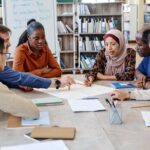In various European cities urban authorities and local stakeholders are exploring ways to tackle challenges arising from recent refugee flows. A central concern is the social integration of refugees: how to connect this particular category of newcomers – and especially the most vulnerable ones – durably with local communities? In this article, we discuss an urban programme that offers young unaccompanied refugees (aged 17–23) cohabitation with young locals (aged 20–30) during a period of one to 2 years in Antwerp (Belgium) in small-scale collective housing units. The programme’s assumption is that this mixed, intercultural communal living will promote regular, informal and meaningful social encounters between refugees and locals, which in turn will strengthen the independence and social inclusion of the young refugees. In this article, we investigate the opportunities top-down organized intercultural communal living creates for refugee integration. We draw on interviews and observations collected among locals and refugees living together to gain insights into both groups of participants’ experiences with collective living and the actual social dynamics emerging in such a setting. Our findings suggest that intercultural communal living can be conceptualized as an environment where various informal forms of social support and mutual learning emerge. As such, we contribute to the conceptualization of the impact of intercultural communal living on newcomer integration.
Multimodal co-therapy for unaccompanied minors: A qualitative study.
Background Unaccompanied refugee minors—or unaccompanied minors—are children and adolescents who have been separated from parents and other relatives and are not being cared for by

